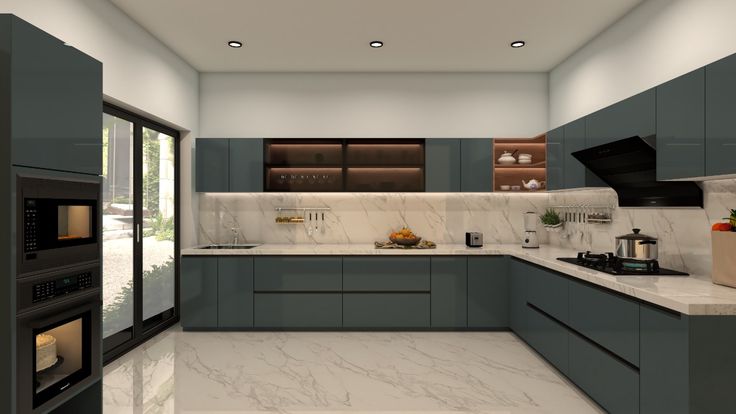Smart Kitchens: How Technology is Changing the Way We Cook
Smart Kitchens: How Technology is Changing the Way We Cook – The kitchen has always been a place for creativity, tradition, and family bonding, but today, it’s also becoming a hub for innovation. As technology continues to advance, it’s transforming the way we cook, eat, and interact with our kitchen spaces. From smart appliances that can be controlled with a simple voice command to gadgets that make meal prep more efficient, smart kitchens are revolutionizing the culinary experience.
In this article, we’ll explore how cutting-edge technology is reshaping kitchens, from enhancing convenience and efficiency to promoting healthier cooking habits. If you’re looking to upgrade your kitchen and embrace the future of cooking, here are some of the top innovations to consider.

1. Smart Appliances for a Smarter Kitchen
One of the most significant changes in modern kitchens is the integration of smart appliances. These appliances can be connected to the internet or controlled via smartphone apps, giving you greater control over your cooking environment. Imagine adjusting your oven’s temperature while you’re sitting on the couch or setting a timer for your coffee maker from across the room.
Popular Smart Kitchen Appliances:
- Smart Ovens: Smart ovens allow you to remotely preheat your oven, adjust cooking temperatures, and even receive alerts when your food is done. Some models even come with built-in cameras that let you monitor your dishes without opening the door.
- Smart Refrigerators: Smart fridges keep track of your grocery inventory, send you reminders when you’re running low on essentials, and can even suggest recipes based on the ingredients inside. Many also feature touchscreens for easy note-taking, streaming music, or keeping track of your family calendar.
- Smart Dishwashers: With a smart dishwasher, you can monitor and control wash cycles from your phone, get notifications when your dishes are done, and even troubleshoot problems remotely.
2. Voice-Controlled Technology
Voice assistants, like Amazon Alexa, Google Assistant, and Apple Siri, have become increasingly common in the kitchen. By simply speaking commands, you can control smart devices, get recipe ideas, set timers, and more—leaving your hands free to focus on meal prep.
Voice-Control Features in the Kitchen:
- Recipe Assistance: Voice assistants can read out recipes step by step or answer cooking questions while you work in the kitchen.
- Smart Appliance Control: Turn on your smart oven, adjust the thermostat of your fridge, or control your coffee machine with a simple voice command.
- Hands-Free Operations: Set timers, turn on lights, or adjust the music—all without touching a button or screen.
3. Smart Cooking Devices
Cooking gadgets have become more intuitive and tech-savvy, providing precise control over the cooking process, ensuring perfect results every time. These smart devices can monitor temperature, cooking times, and even give real-time feedback to help you improve your culinary skills.
Must-Have Smart Cooking Gadgets:
- Smart Thermometers: A smart meat thermometer can be inserted into your food and will send notifications to your phone, alerting you when the food reaches the perfect temperature. It can also recommend the best temperature for various types of meat.
- Smart Pressure Cookers: Devices like the Instant Pot now come with smart features, including preset programs and smartphone connectivity. These gadgets allow you to set cooking times remotely and monitor the cooking process in real time.
- Precision Cookers (Sous Vide): Sous vide cookers offer precise control over cooking temperatures, ensuring your food is cooked to perfection. Smart sous vide devices let you control the temperature and cooking time via an app, giving you hands-off cooking without compromising taste.
4. Smart Lighting and Ambient Features
Lighting plays a crucial role in setting the mood and enhancing functionality in the kitchen. Smart lighting systems now allow you to adjust the brightness, color, and ambiance of your kitchen with ease. Whether you’re cooking a romantic dinner or prepping a quick breakfast, the right lighting can make all the difference.
Smart Lighting Options:
- Color-Changing Lights: Create the perfect atmosphere with color-changing bulbs that can be controlled via an app or voice assistant.
- Motion-Activated Lights: Automatically illuminate the kitchen when you walk in, saving you the hassle of fumbling for a switch while your hands are full.
- Task Lighting: Adjust task lighting over counters, sinks, or workspaces to make chopping, reading recipes, or cleaning more convenient.
5. Smart Cooking Platforms and Apps
In addition to physical gadgets, various apps and digital platforms are changing the way we approach meal planning, grocery shopping, and cooking. Many of these apps are designed to make your kitchen smarter and more efficient, offering recipe suggestions, grocery lists, and more.
Helpful Smart Kitchen Apps:
- Recipe and Meal Planning Apps: Apps like Yummly, Big Oven, and Paprika can help you find recipes, build shopping lists, and plan meals based on dietary preferences or the ingredients you already have at home.
- Grocery Delivery Services: Services like Instacart and Amazon Fresh make it easy to order groceries online, integrating with smart fridges or pantry tracking apps that let you know when you’re running low on ingredients.
- Smart Recipe Assistants: Some apps integrate with smart cooking appliances, offering step-by-step cooking instructions, adjusting cooking settings, and notifying you when it’s time to move to the next step.
6. Smart Waste Management
Sustainability is another area where technology is stepping in to improve kitchen efficiency. Smart waste management systems can help reduce waste by encouraging recycling and composting while providing you with data on your kitchen’s waste production.
Innovative Waste Solutions:
- Smart Trash Cans: High-tech trash cans, like the Simplehuman Sensor Can, open with a motion sensor, making it easy to dispose of waste hands-free. Some models even have separate compartments for recycling and compost.
- Composting Systems: Smart composting devices can accelerate the composting process, turning food scraps into nutrient-rich compost faster than traditional methods. Some smart composters are also designed to be odor-free and energy-efficient.
7. Health and Wellness Integration
With the rise of health-conscious living, smart kitchens are also making it easier to stay on top of your nutrition. From appliances that track calorie intake to systems that recommend healthier meal options, technology can help you achieve your wellness goals while you cook.
Health-Focused Technology:
- Smart Scales and Nutrition Trackers: Devices like smart food scales can weigh ingredients and calculate their nutritional content, helping you make healthier meal choices.
- Air Fryers and Smart Ovens for Healthier Cooking: These devices promote healthier cooking techniques, such as air frying or convection baking, which reduce the need for excessive oils and fats while still delivering delicious meals.
8. Connected Smart Kitchens
The future of cooking is all about integration and automation. With a fully connected kitchen, appliances and devices work together seamlessly, making the cooking process more intuitive and streamlined. Imagine an oven that adjusts its temperature based on a recipe, a refrigerator that tells you when ingredients are nearing expiration, and a coffee machine that starts brewing as soon as your alarm goes off.
Key Benefits of Connected Kitchens:
- Remote Control: Control appliances from anywhere via your smartphone, even when you’re away from home.
- Seamless Integration: Appliances can communicate with each other, making cooking more efficient. For example, your fridge could suggest recipes based on what’s inside, while your oven preheats automatically when it detects you’re preparing to cook.
- Automation: Set up cooking schedules or personalized routines, such as automatically adjusting the temperature or setting timers, so your meals are always ready when you need them.
Final Thoughts
The rise of smart kitchen technology is transforming the way we cook, eat, and manage our kitchens. From smart appliances and voice-controlled assistants to integrated cooking platforms and waste management systems, technology is helping to streamline cooking tasks and make kitchens more efficient, eco-friendly, and health-conscious.
As we move forward, the smart kitchen will continue to evolve, offering even more innovative solutions to make our culinary experiences easier, more enjoyable, and tailored to our needs. Whether you’re looking for convenience, energy savings, or healthier cooking options, embracing smart kitchen technology is a great way to future-proof your kitchen while enhancing your overall cooking experience.




